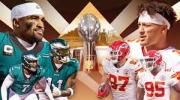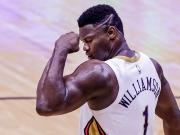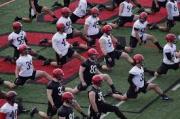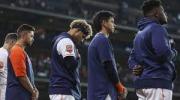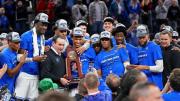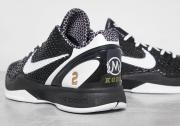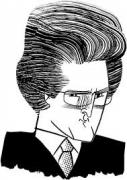Gene Therapy: Where Are All the Brother's At?
The Issue!
When the rumors began to trickle out that Marcus Freeman would be the next head football coach at Notre Dame, I was happy for him and even more happy for us. “Hey, we’ve got one!” That’s what I told a colleague jokingly; but as I began to raise my hands in triumph, I realized that this in itself was the problem. After all, why should a black man being hired to coach a team in a sport dominated by black men elicit such joy? Even at Notre Dame, a university where the team tends to be filled with more white players than people of color, it is almost an even split. It’s a surprise because when you get past the newly hired Freeman, and a couple other names around the landscape, it becomes extremely difficult to drum up names of coaches who look like the majority of the players on the teams.
More disturbing is that we hear about all of these up and coming coordinators, these fast risers, the coaches who are destined to be head coaches and none of them seem to be black. We see people get head coaching jobs who seem to have come out of nowhere and yet, still no jobs for black coaches. Even the lower level coach who is killing it or in some cases just doing a decent job. The white coaches seem to find that upward mobility much faster than black coaches or even worse, the black coach never gets the opportunity to reach that level. As a black coach, it is disappointing to not see men who look like me given the same opportunities to lead programs. So the Freeman hire gets reduced to throwing us a bone. It will be applauded and spoken about as if this is a point in history when everything changed but this yearly game of coaching musical chairs will undoubtedly end as it usually does every season. Most of the black coaches will be left standing and looking with no seat to sit in while they look at other coaches who never have to worry about finding a seat.
The Effect!
The lack of minority leaders in this game has a deleterious effect on the young men who play the game. We have been programmed to believe that it is the league or bust and that making it to the league is achieved only through playing. Many black players don’t think about coaching or other jobs in sports until they have exhausted every other avenue to play the game. Why is that? When most black kids start playing the game, the youth league is full of strong black coaches with magnetic personalities who are looking to give back and set an example. But, as those young black kids progress they see less and less black men in charge. The high school level has a ton of black coaches but far less black head coaches and hardly any at the well-respected or well-funded schools. When they get to college, outside of the HBCU’s you will be hard pressed to find a wealth of black head coaches at any level. So who do they have to look up to in the profession; who do they gleam their example from? For most of my life I never believed a black man could be president but when I was in my mid-20’s I saw it happen. Over those eight years the amount of young black people who became more involved or interested in politics was astronomical. You can point to the interest and involvement in Golf once Tiger Woods came on the scene. Black men in football need to see black leaders in order to understand with certainty that they too can lead a football team.
The Solution!
As always, complaining about a problem without a solution is useless. What makes this problem difficult is that there does not seem to be an easy solution in place. It is not as easy as just saying “hire more black head coaches.” I really wish it was but the problem is not a lack of qualified candidates like many would have you believe. We routinely see qualified black coaches in the NFL passed over for lesser experienced white coaches who have been deemed geniuses. We have seen the goal post move from defense to offense to special teams when it has suited those making the choices. The problem is value. The decision makers don’t see the value in hiring a black coach because they are getting the commodity without the black coach. But what would happen if the commodity dried up except in places where there were black coaches? Would that not streamline the process of more programs grabbing black coaches to lead their team? If at the end of the day: great players equal wins, wins equal eyeballs, and eyeballs equal dollars; then the solution is simple. Unfortunately the execution is hard.
As with most movements for equality, the youth must lead the way. The highly touted prospects need to shun schools being led by coaches who don’t look like him. Imagine if Notre Dame landed the top recruiting class four years in a row based solely off of who the coach was at the school. Copycat syndrome would ensue and other universities would follow suit. Imagine if the HBCU’s, who are already among the largest attendance-drawing FCS programs in the country, began to get four and five star talent regularly and directly out of high school. The landscape of the FCS would change so fast that the entire SWAC and MEAC might decide to go to the FBS that would then mean more scholarships and more of the best and brightest taking their talents to places like FAMU and North Carolina A&T. We have seen the impact that Coach Prime and his staff have made in less than a year at Jackson State. It would not take long. But it would mean that some of these young men would need to prioritize the cause, over 100 million dollar facilities. The allure of places like Georgia is not the history because as black people we understand there was a time when we were not welcome there. The allure is the amenities and the perceived fast track to the NFL. The truth is that the NFL doesn't care where you play, they care that you can play. So they will go where the talent is. As for the amenities, they follow the money and the money follows the talent.
Years ago, when one athletics program integrated, it was not long before the other programs followed suit. Why? Because the teams with black players were better. In the end it has always been about talent. The talent on the field will always trump the talent on the sidelines because in honesty at the collegiate level there is not a chasm between the winning coaches and the losing one's abilities, there’s usually a gap in talent. How long do you think it would take for these programs to start hiring black head coaches, if it meant keeping the talent coming?
###
Gene Clemons is a Sports Analyst and Contributor to CWN Sports. His weekly column and podcast - Gene Therapy focuses on Sports, Politics and Social/Urban issues.
Read more


